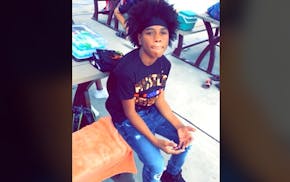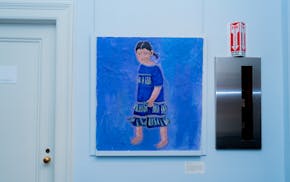Never read the comments.
That's the first lesson of this business. And it's one I usually follow.
Since the Minnesota Star Tribune, my first employer after college, asked me to return to write an occasional column from the perspective of an African American writer in the wake of George Floyd's murder five years ago, I've received more feedback than I ever imagined I would. With racism and discrimination and the fight for inclusion and equity as the backdrop of these columns, readers have responded with an abundance of love and hate.
I'm unmoved by the latter. At least I thought I was.
For the Minnesota Star Tribune's recent package on the five-year anniversary of Floyd's murder, I had the honor of writing about that milestone from the perspective of Gianna Floyd, his now 11-year-old daughter.
While the Strib would not allow anyone to comment on the column on its website, social media outlets like Facebook, Twitter and Instagram do not have the same restrictions. Through those portals, there were many who offered support and condolences with their comments. But others posted comments that were scathing, repugnant and completely disrespectful about a daughter in mourning and a father who was murdered before he could speak for himself.
I had convinced myself that once children were involved, even the worst of us would refrain from bad behavior. Instead, a column about a little girl seemed to activate the haters. There were just so many hateful comments — comments an 11-year-old girl, who has faced bullies at school, can read on her phone.
As I read through the reactions – there were 74 laughing emojis on the Star Tribune's Facebook post of the column – I felt sad. Not for me. But for Gianna and the world she'll have to battle for years to come as she grapples with her own identity and a father she never got the chance to truly know.
That sadness made me feel something I've never felt before: Maybe it's time to end this column.
I wanted to highlight Gianna Floyd's pain and plight without adding another burden to her life, but it's not possible to shield anyone, not even our youth, in this powder keg we're living in, I've realized. Everything is combustible right now.
I am not afraid of the folks who view my identity or my perspective as a threat. I never have been. Not even in college when I received death threats for similar columns, or after a classmate — a leader in the student senate — created a popular petition on campus to "send you back to Africa." But the kids? They're just trying to live. I thought we'd all agreed to leave them alone. I was wrong. Perhaps that means the moment has passed — that the growing apathy of the ones who claim to support those of us who just want to be treated as human beings and the activated vitriol among those who view that fight as infringement on their collective existence have hardened this world more rapidly than I had anticipated.
I have to admit that the negative reaction on the column about Gianna Floyd — there were a lot of positive comments too – made me lose some of the hope and optimism I've held onto, not just for me but for the next generation.
Five years ago, I was warned about this. A woman who'd once worked with former Milwaukee Journal-Sentinel columnist Eugene Kane — a hero of my childhood, a champion of equality and the inspiration for my work — congratulated me when the column was announced. She also shared her concern that this kind of work might one day wear me down and become heavier than I could understand then.
She was right. I've been fortunate to interact with members of this community for years. And I've met so many incredible, uplifting and positive people. They're the reason I've continued to write. They deserve to be heard. And they've meant more to me than they might know.
In this space, I've never attempted to tell anyone what Black people in Minnesota think, believe or endure. The Black community here, like any community, is not a monolith. I've only desired to tell my story as a Black man in the Twin Cities, which in turn has allowed me to tell stories of shared experiences. I've spoken for myself — but also for others who've felt connected to the stories I've told about my life in Minnesota for nearly 25 years.
Two weeks ago, I was proud to write about George Floyd's daughter five years after his murder compelled me to pick up my own megaphone and speak. I was also glad to know she's doing OK, despite the challenges she's already endured.
But the vile comments on a column about her also provided a startling realization that even an 11-year-old is not safe from the most awful folks within our communities. And that was discouraging.
Because although I was grateful to speak with her, I was also heartbroken when I realized that no one will be able to protect her.

Medcalf: This summer, let's all be more vigilant about our children — and everyone else's

Medcalf: Mia program provides safe space for young people to create

Medcalf: George Floyd's daughter, now 11, on life without her dad: 'It's hard'


